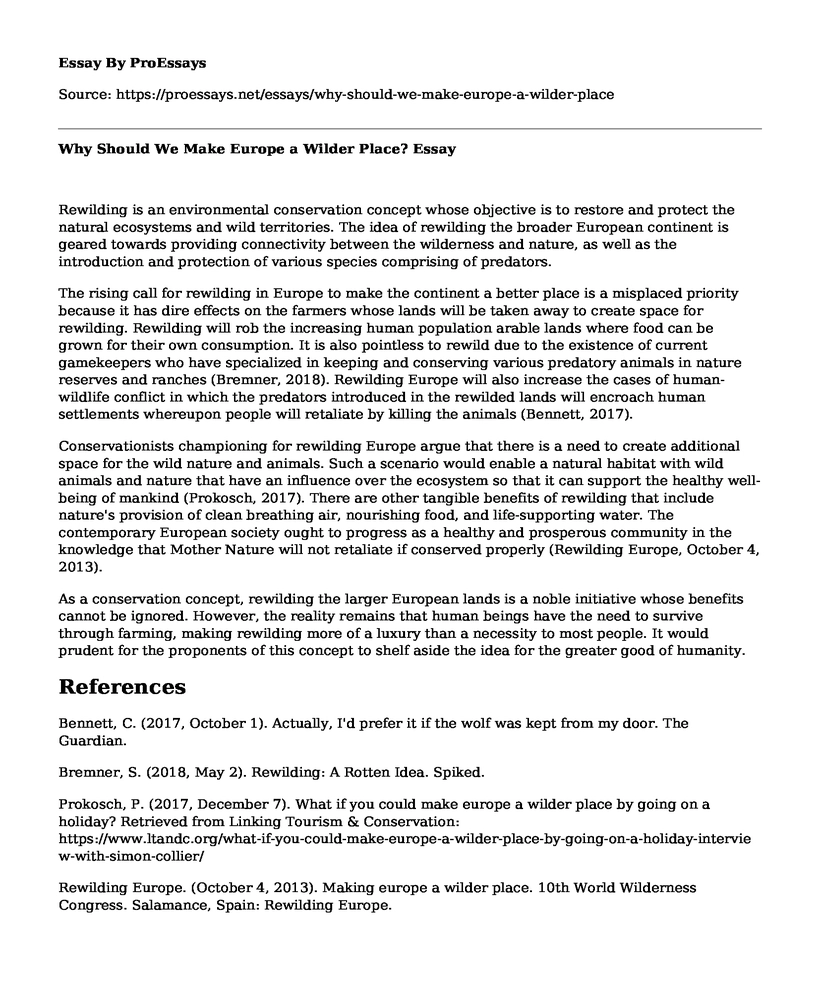Rewilding is an environmental conservation concept whose objective is to restore and protect the natural ecosystems and wild territories. The idea of rewilding the broader European continent is geared towards providing connectivity between the wilderness and nature, as well as the introduction and protection of various species comprising of predators.
The rising call for rewilding in Europe to make the continent a better place is a misplaced priority because it has dire effects on the farmers whose lands will be taken away to create space for rewilding. Rewilding will rob the increasing human population arable lands where food can be grown for their own consumption. It is also pointless to rewild due to the existence of current gamekeepers who have specialized in keeping and conserving various predatory animals in nature reserves and ranches (Bremner, 2018). Rewilding Europe will also increase the cases of human-wildlife conflict in which the predators introduced in the rewilded lands will encroach human settlements whereupon people will retaliate by killing the animals (Bennett, 2017).
Conservationists championing for rewilding Europe argue that there is a need to create additional space for the wild nature and animals. Such a scenario would enable a natural habitat with wild animals and nature that have an influence over the ecosystem so that it can support the healthy well-being of mankind (Prokosch, 2017). There are other tangible benefits of rewilding that include nature's provision of clean breathing air, nourishing food, and life-supporting water. The contemporary European society ought to progress as a healthy and prosperous community in the knowledge that Mother Nature will not retaliate if conserved properly (Rewilding Europe, October 4, 2013).
As a conservation concept, rewilding the larger European lands is a noble initiative whose benefits cannot be ignored. However, the reality remains that human beings have the need to survive through farming, making rewilding more of a luxury than a necessity to most people. It would prudent for the proponents of this concept to shelf aside the idea for the greater good of humanity.
References
Bennett, C. (2017, October 1). Actually, I'd prefer it if the wolf was kept from my door. The Guardian.
Bremner, S. (2018, May 2). Rewilding: A Rotten Idea. Spiked.
Prokosch, P. (2017, December 7). What if you could make europe a wilder place by going on a holiday? Retrieved from Linking Tourism & Conservation: https://www.ltandc.org/what-if-you-could-make-europe-a-wilder-place-by-going-on-a-holiday-interview-with-simon-collier/
Rewilding Europe. (October 4, 2013). Making europe a wilder place. 10th World Wilderness Congress. Salamance, Spain: Rewilding Europe.
Cite this page
Why Should We Make Europe a Wilder Place?. (2022, Jun 17). Retrieved from https://proessays.net/essays/why-should-we-make-europe-a-wilder-place
If you are the original author of this essay and no longer wish to have it published on the ProEssays website, please click below to request its removal:
- Electronic Waste (E-Waste): Time to Reduce, Reuse, and Recycle
- Environmental Impact of Personal Lifestyle Paper Example
- Essay Example on Street Refuse: Composition & Sources of Pollution
- Essay on International Politics: Disarmament, Nuclear Proliferation, and Environmental Impact
- Essay Example on Urban Solid Waste Management: Challenges & Solutions
- Public Health After Natural Disasters: A Case Study of Pakistan Flood 2010
- Paper Example on California's Water Crisis: Drought, Urbanization and Loss of Wetland







